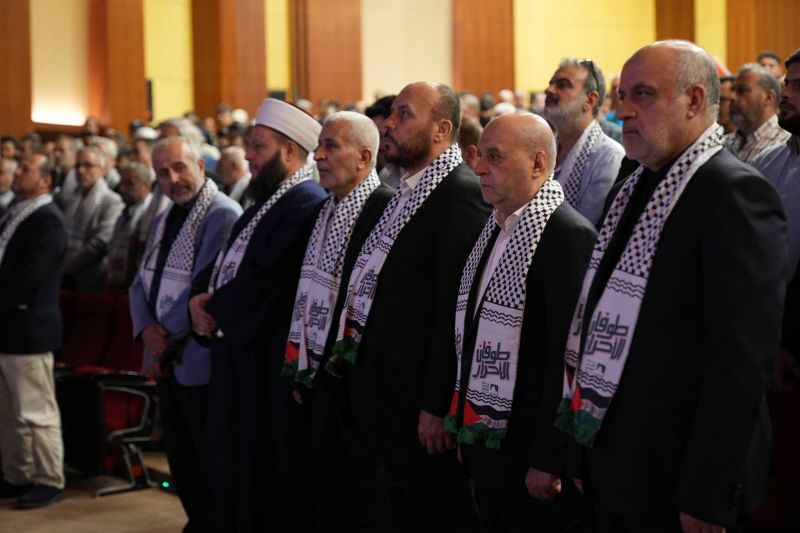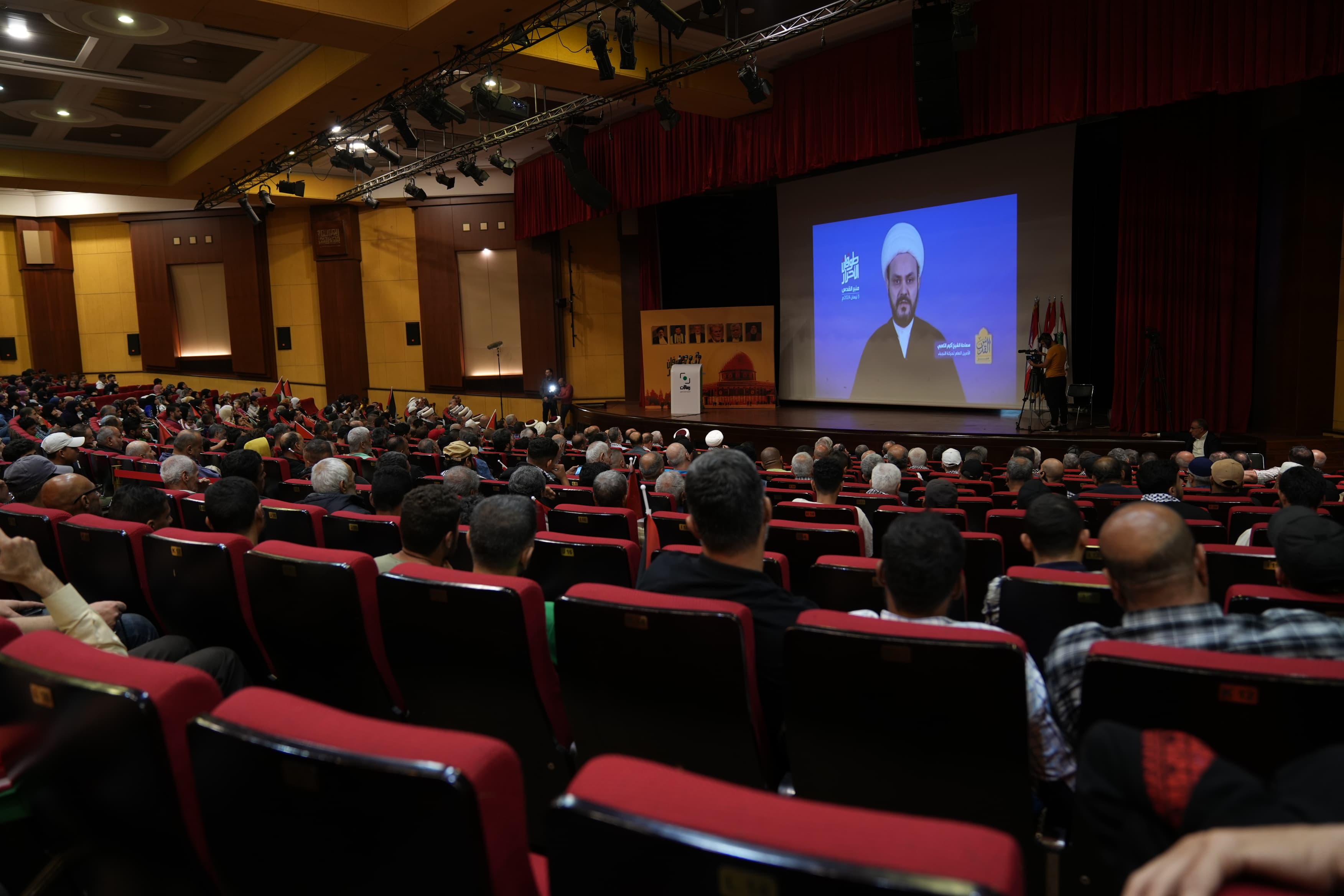
Attendees stand at the Rissala Theater in Ghobeiri, in Beirut's southern suburbs, during a gathering ahead Jerusalem Day on Friday. (Credit: Mohammed Yassine/L'Orient Today)
Hezbollah leader Hassan Nasrallah said on Wednesday that the support fronts for Gaza, opened by various groups of the so-called "resistance" axis to Israel, remain active and are "not leaving the field," as the offensive against the Palestinian enclave enters its seventh month.
"When we talk today about Operation al-Aqsa Flood, I can say that this is a question that concerns the existence or annihilation of Israel," stressed the party leader, in an address broadcast during a ceremony in honor of "Jerusalem Day," observed each year on the last Friday of the month of Ramadan by "resistance" groups. Other leaders of this axis also spoke at the event.
Al-Aqsa Flood is the name given to the attack carried out by the Palestinian Islamist movement Hamas in Israel on Oct. 7, which resulted in the deaths of at least 1,160 people. According to Israel, some 250 people were kidnapped, 130 of whom are still being held hostage in Gaza. Following this deadly attack, Israel launched a violent offensive on Gaza, with the aim of defeating Hamas. Strikes and clashes in the enclave have so far claimed almost 33,000 lives, mainly civilians, according to the Gazan health ministry.
"Emerging victorious from the battle"
"We hope that the Flood will increase, grow and strengthen over time. The resistance front, in Yemen, Lebanon and Iraq, moreover, is under pressure and continues its work, without leaving the field," he added. "We thank the support front in Iran, which faces many threats. Iran and its leaders remain a clear and decisive supporter of the Palestinian cause and resistance movements in the region," continued Nasrallah.
"Some people focus on the scale of the sacrifices made and ignore all the achievements of the resistance, in order to serve the interests of the enemy. We are working to emerge victorious from this battle," he insisted. "The Israeli enemy has no regard for the cease-fire resolutions issued by the UN Security Council, nor for the appeals of all the countries of the world or their overwhelming majority, nor for the international community, and it continues in the line of its crimes and brutality," he added. On March 25, the UN Security Council adopted a resolution calling for an immediate cease-fire in Gaza, but this has so far failed to put an end to the Israeli offensive.
At the ceremony in Ghobeiri, Nasrallah did not go into detail about the open front against the Israeli army in southern Lebanon. He is expected to do so in much greater detail in a speech scheduled for Friday, the official date of "Jerusalem Day." Israel and Hezbollah have been engaged in near-daily clashes since Oct. 8, 2023, the day after the start of the war between Israel and Hamas. By L'Orient-Le Jour's count, 267 Hezbollah members have been killed in Israeli strikes in Syria and Lebanon since Oct. 8.
 Attendees watch a speech during a gathering in Beirut's southern suburbs. (Credit: Mohammed Yassine/L'Orient Today)
Attendees watch a speech during a gathering in Beirut's southern suburbs. (Credit: Mohammed Yassine/L'Orient Today)
To attend this speech and those of the other leaders of the "Axis of Resistance," some 700 people gathered at the Rissala theater in Ghobeiri, in the southern suburbs of Beirut, waving Palestinian flags and wearing keffiyehs, reported our local journalist. They came from Beirut, but also from Saida, like Intissar Ibrahim, a Palestinian in charge of the institution of Palestinian martyrs from the Ain al-Hilweh camp. "We came as we do every year to attend the celebration of al-Quds, but this year we're looking forward to the speeches by the leaders of the resistance," she told L'Orient-Le Jour.
Among the audience, Mohammad Farah Sleiman, from Ain al-Hilweh, hopes to hear the announcement of a strong response after the attacks suffered by the pro-Iran axis in Damascus and Lebanon. "I hope there will be a direct response from southern Lebanon or the Golan Heights," he says. He confided that his nephew, Riad Mohammad Iblawi, had died on the border during an operation with Islamic Jihad.
Other speeches included one by Hamas leader Ismail Haniyeh, who asserted that his movement "stands by the conditions set for an agreement" in negotiations with Israel, including "the withdrawal of the Israeli army from Gaza." "We stand by our demands: A permanent cease-fire, a total withdrawal of the enemy from the Gaza Strip, the return of all displaced persons to their homes, the authorization of aid for our people in Gaza, reconstruction, an end to the blockade and an honorable exchange of prisoners."
"The Zionist occupation continues to prevaricate obstinately and does not respond to our legitimate demands to put an end to the war and aggression," declared Haniyeh. He also denounced "the direct participation of the Americans" in the war in Gaza by supplying arms and ammunition to the Israeli army.
This article originally appeared in French in L'Orient-Le Jour.